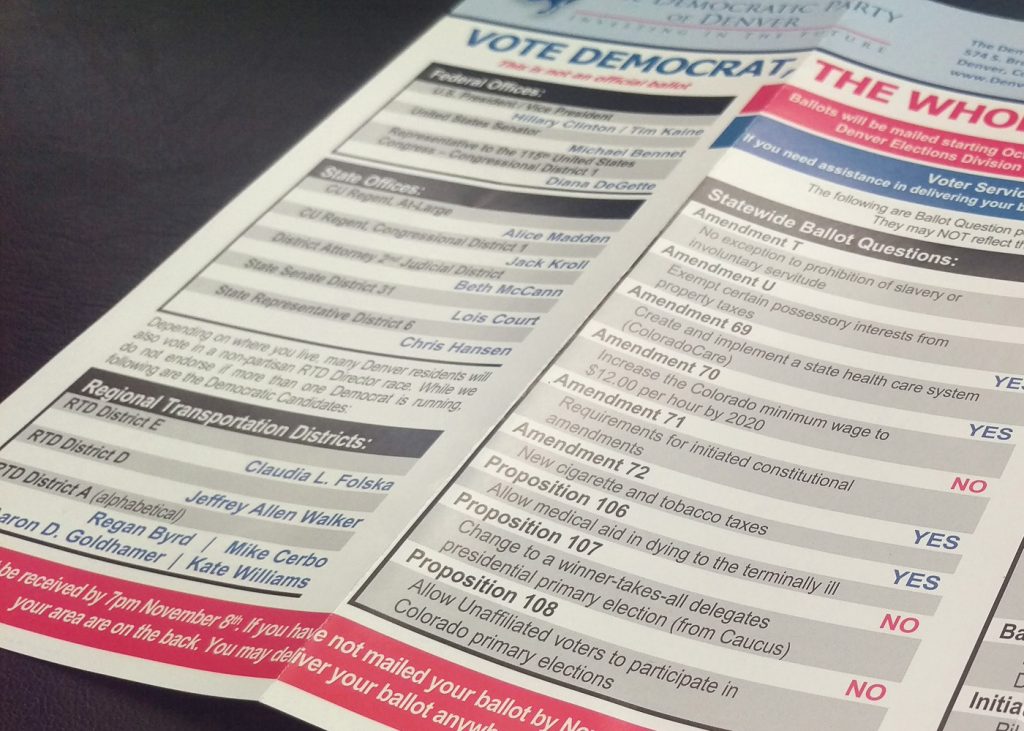
About those last two ‘NO’s…
My wife and I got a letter from a woman named Laura Chauncey Mullins the other day, from 574 S. Broadway Blvd. in Denver. The addresses, both the return and ours, had been mail-merged onto standard Avery stickers. Knowing enough about Broadway to sense that this was a business address, I was on the cusp of a no-open recycle when I noted the standard USA FOREVER stamp, which gave me pause.
I opened it to find a glossy trifold from the Democratic Party of Denver. Below some contact information, in red and blue lettering, were the words, “VOTE DEMOCRAT, THE WHOLE BALLOT, NOTHING LESS.” A quick google search found Laura Chauncey Mullins to be on the HD6 Leadership Team, and 574 S. Broadway to be the strip-mall home of the Democratic Party of Denver, nestled up next to an acupuncture studio.
My initial reaction was to push back. I’m a registered Dem, sure. But this trifold was telling me how to think, and I at least try to delude myself into thinking I think for myself.
Still, I was curious as to how well our views aligned. I found that they did so more or less perfectly, and that I could well vote Democrat, the whole ballot, nothing less, if not for disagreeing on two propositions. They have to do with a) primaries and b) open primaries.
The first, Proposition 107, is a statewide measure to switch over from a caucus to a primary. The second, Proposition 108, allows unaffiliated voters to participate in Colorado primary elections, should 107 pass.
Proposition 107 is easy. Caucuses are may work for rural towns or places where people don’t bother to vote. But they’ve become a disaster in places like Denver, where people lined up for hours at the local elementary school. Folks bailed, understandably. Switching back to a primary system (the state did them three times until 2000) will cost about $5 million once every four years, according to the Legislative Council of the Colorado General Assembly’s beeft blue book. We have a state GDP of $295 billion and growing; we can afford to invest a sliver of it into the democratic process so we can all just mail it in. So yes on 107, I say, even if the trifold disagrees.
Proposition 108 isn’t a whole lot harder. Thirty-five percent of Colorado voters are unaffiliated. They have no say in the selection of general-election candidates. The major parties don’t like the idea of just anybody walking in and voting on candidates they’ve nurtured: if you want to vote in our primary, register with us. The system could be gamed, maybe, too. Look at Rush Limbaugh, who urged his followers to apply their lunatic-right open-primary votes to a person whom, according to Limbaugh’s fine-tuned political radar, he viewed as the far weaker candidate: Barack Obama.
So yeah.
The Denver Dems’ trifold gives a big, red ‘NO’ to 108, too. I understand: it stomps on what they view as their turf. Prop 108 gives convenient voice to independents who otherwise would have to change their party affiliation before a primary, then, I suppose to maintain appearances, change it back to “independent” afterward – which nobody, statistically speaking, does.
I think Prop 108 is a big deal, as it should be for anybody observing Donald Trump’s electoral meltdown. The key is the second “argument for” in the blue book: “Allowing unaffiliated voters to participate in primary elections may result in candidates who better represent all Coloradans. In a closed primary, voter participation is typically low and the candidates selected often appeal to a small number of a party’s more active members.” Unspoken here is that people are independent because they enjoy being told how to vote roughly as much I do, and, odds are, because policies of the far-left and the far-right make them uneasy. So by and large, they’re going to vote more practically — otherwise known as centrist — than your standard primary die-hard.
Now, in the 2016 primaries, Trump carried many of the 21 states that already have some sort of open primary, so it’s doubtful that open primaries did much to help avoid what is becoming a GOP catastrophe. But think ahead to 2020: wouldn’t it be nice to have some centrist influence of the early in the process? Rather than watch the same thing happen again? Because guess what: if the GOP keeps plopping fringe-right manipulative nutbucket dissimulators at the top of the ticket, over time the quality of the Democratic candidates can slide – qualitatively or philosophically – without worrying too much about losing the general. And that’s bad for everybody.
It works both ways, too. Bernie Sanders won the Colorado caucus. He won 22 states, quite a few of them with open primaries. But this is a candidate whose policies (free college, universal health care) are often more aspirational than practical in 2016. He might have had a shot against a candidate as flawed as Trump, but a centrist Republican would have demolished him.
So, to Laura Chauncey Mullins and my generally like-minded friends at the Democratic Party of Denver: yes, I agree – except when I don’t.

1 Comment
On open primaries and avoiding the next Trump: https://t.co/mc68O68zQ3 #Election2016
Comments are closed.